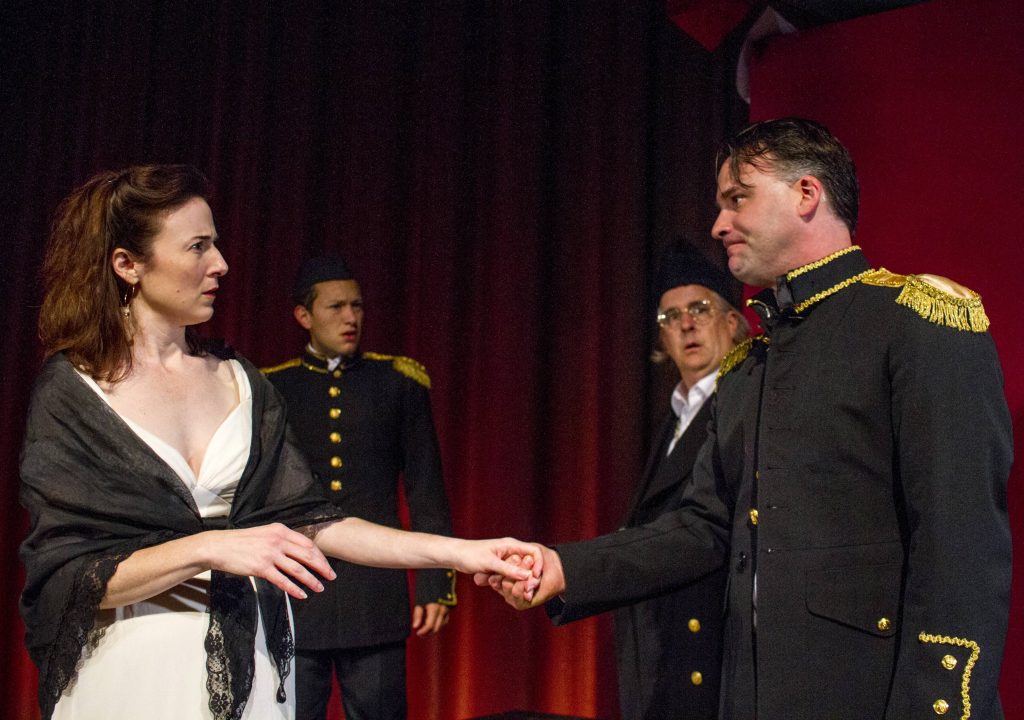A Gloomy and Merry Winter
The Winter’s Tale might not seem like an ideal choice for the first production, due to the unusual tonal change that occurs halfway through the plot. Luckily, Intrepid has crafted an expertly handled, sometimes hilarious and bittersweet rendition of the “problem play.”
Taking place “once upon a time” in the Kingdom of Sicilia, King Leontes (Intrepid’s co-artistic director, director of operations and co-director of the play, Sean Yael-Cox) lives a peaceful life with his loving wife, Hermione (Jo Anne Glover), and young son, Mamillius (Merrick Hanna). Suddenly, Leontes becomes mad upon hearing his royal friend from Bohemia, King Polixenes’ (co-director Brian Rickel), intimate conversation with Hermione. He is convinced that the two are having an affair behind his back, which leads to unforeseen consequences.
What makes The Winter’s Tale so unusual is that the epic switches from a dark character study to a relatively light comedy. Although some drama is featured, the end of Act 1 and the majority of Act II loses the gloom.
A problem that can impact other versions of The Winter’s Tale is the believability of Leontes’s insanity. What makes Yael-Cox’s depiction credible is the way the directors develop the relationship between Leontes and Polixenes.
In prior stagings, Leontes and Polixenes seem too close to have any bad blood come between them. As portrayed by Yael-Cox and Rickel, the friends appear to have an intense rivalry from the very beginning. They interact with a mixture of respect and envy.
Yael-Cox plays Leontes with resentful anger, and he makes choices that allow the king to not just come across as a psychotic tyrant. He injects moments of sadness, acidic wit and empathy to make audiences hope that he redeems himself by the conclusion.
Only eight actors are used to portray all the roles throughout the evening. With the exception of Hanna, everyone is cast in several parts. Danny Campbell, Glover, Erin Petersen and Marco Rios are very sympathetic as individuals in the middle of abnormal conflicts. They have a sense of urgency in their acting style, which raises the tension for their situations.Earning most of the laughs are Jacque Wilke and Rickel as a Shephard and a Clown. Not only do they handle their verbal dialogue hysterically, but even the silly way they walk results in grins. Hopefully, they can reteam for another comedy in the future.
Yael-Cox also loosens up in his scenes as the treacherous conman, Autolycus. Singing spoofs of songs from The Beatles, The Rolling Stones and Elvis Presley, the artist energizes events with oily sleaziness.
As mentioned before, Shakespeare Unplugged is intended to focus on prose, but kudos to the creative team for making Bohemia come alive. Sicilia is explored in a straightforward manner to draw attention to the complex words, yet Bohemia has a merry atmosphere. Curtis Mueller’s shadowy lighting, live music from Yael-Cox on guitar and prerecorded songs including “Hard Sun” and “Way Back When” (the crisp audio from the directors) adds folksy appeal to the upbeat land.
Shakespeare gives theatregoers a lot to take in with messages about masculinity, flawed relationships and the passage of time. What the directors are able to do is condense certain segments without losing any of the emotion. That is an issue several Shakespeare adaptors have struggled with, but Yael-Cox and Rickel never fall into that trap.
If any in the audience are bothered by the abrupt shift in the narrative, those that get sucked in will find the drama/comedy to be a powerful experience. Months will pass by before Shakespeare Unplugged returns to Intrepid; however the grim Titus Andronicus is going to commence a month long run in late February.
[box] Show times are Wednesdays at 7.30 p.m, Saturdays at 2:00 p.m, Sundays at 7:00 p.m and Tuesdays at 7:30 p.m. [/box]

A fan of theatre from a young age, David Dixon began writing reviews while in middle school, for Union Tribune’s Rated G column and sdcnn.com. He was the Entertainment Editor for SDSU’s The Daily Aztec. Currently, he contributes to San Diego Community News Network, a regional reviewer for Talkin’ Broadway, an interviewer for San Diego Theatre Reviews and has won several San Diego Press Club Excellence in Journalism Awards. David is a San Diego Theatre Critics Circle member, an American Theatre Critics Association member & Regional Theatre Tony Award voter.




